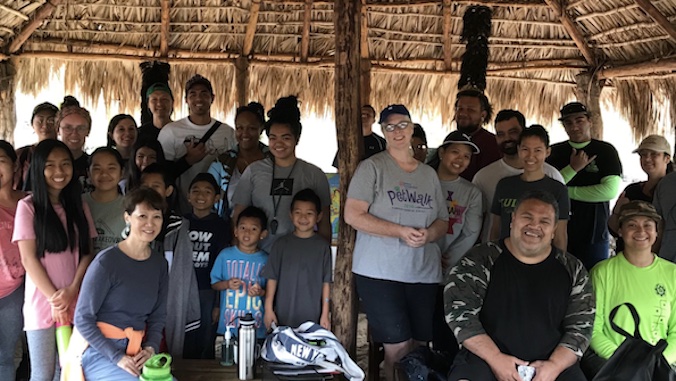
Ke Aʻo Mau means “learning preserved,” and preserving the knowledge of Native Hawaiian cultural practitioners lies at the heart of the course and program at the University of Hawaiʻi at Mānoa’s Thompson School of Social Work & Public Health.
The Ke Aʻo Mau course, first offered in spring 2018, will welcome its seventh cohort in spring 2024. The course is intended to be interdisciplinary and is designed to educate public health and social work students on ancestral practices that may benefit health, healing and social justice of Native Hawaiians and other peoples of Hawaiʻi. It optimizes the authenticity of cultural learning through the engagement of kumu loea (expert teachers) to instruct in their area of expertise.
I have struggled with my identity as a Native Hawaiian because as much as I identify as Hawaiian, I do not feel Hawaiian
—Tehani Keanini
“I have struggled with my identity as a Native Hawaiian because as much as I identify as Hawaiian, I do not feel Hawaiian,” said Tehani Keanini, Ke Aʻo Mau participant and 2023 MSW graduate. Through Ke Aʻo Mau, I realized that knowledge is crucial to addressing that inadequate feeling, discovering oneself, and strengthening the feelings of enthusiasm toward learning cultural practices and interventions. It helped me recognize that the present connects to the past and gives way and direction for the future, and helped me recognize, reconcile, navigate, evaluate and reflect on both the Western and Native Hawaiian parts of myself. This in turn helped me answer the question, ‘Who am I?’“
The course is part of the Ke Aʻo Mau program, which is funded by the Hawaiʻi Pacific Foundation. With an emphasis on Native Hawaiian culture, it is part of the Thompson School’s commitment to Indigenous learning and an extension of the Hawaiian Learning Program.
“Ke Aʻo Mau’s efforts are directed at increasing the reach and impact of culturally anchored practices as it relates to social justice and health,” said Theresa Kreif, principal investigator of the program. “Ke Aʻo Mau aims to be one component of the development of a social welfare and public health workforce that is interdisciplinary, community based and culturally anchored in Native Hawaiian knowledge (ʻike), skills and values.”
Learning from kumu loea
A recently published book Ka Māno Wai by UH Press, serves as an educational resource for the course with moʻolelo (stories) of kumu loea in culturally anchored practices such as ʻōlelo (language), lomilomi (massage), lāʻau lapaʻau (herbal medicine) and hoʻoponopono (forgiveness practice).

During each week of the class, a different cultural practitioner visits the class to share traditional practices with students. This allows the students to more fully understand “form vs. essence.” This concept is one of the foundational elements of Ke Aʻo Mau. Students form an understanding for the individuals and communities they are working with who have cultural solutions, and that health practitioners must create space to listen, observe and value the essence of a cultural solution.
Students also volunteer 15 hours to a Native Hawaiian servicing organization. This work and associated projects represent their journey to develop a deeper understanding of a Native Hawaiian-serving organization, and ultimately contribute to these efforts.
The culminating event of the course is a huakaʻi (journey or mission) where students and their ʻohana and program alumni gather to Ma Ka Hana Ka ʻIke (to learn by doing, ʻŌlelo Noʻeau #2088).
Program roots
Former Thompson school Dean and Professor Emerita Noreen Mokuau developed the course and program with faculty specialists Kreif and Shayne Kukunaokala Yoshimoto. Strong support for Ke Aʻo Mau continued with former Interim Dean Tetine Sentell and current Dean Alex Ortega.
“Since its inception six years ago, Ke Aʻo Mau has given rise to a thriving community,” said Kukunaokalā Yoshimoto, lead instructor of the course. “Haumāna (students) have built an informal network of support for each other, and even include their ʻohana and field instructors in the learning experience.”


